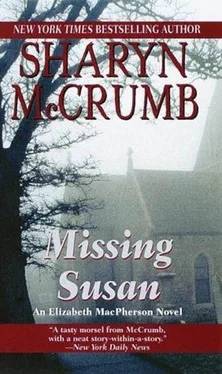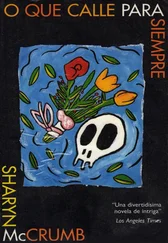Sharyn McCrumb - Missing Susan
Здесь есть возможность читать онлайн «Sharyn McCrumb - Missing Susan» весь текст электронной книги совершенно бесплатно (целиком полную версию без сокращений). В некоторых случаях можно слушать аудио, скачать через торрент в формате fb2 и присутствует краткое содержание. Жанр: Детектив, на английском языке. Описание произведения, (предисловие) а так же отзывы посетителей доступны на портале библиотеки ЛибКат.
- Название:Missing Susan
- Автор:
- Жанр:
- Год:неизвестен
- ISBN:нет данных
- Рейтинг книги:3 / 5. Голосов: 1
-
Избранное:Добавить в избранное
- Отзывы:
-
Ваша оценка:
- 60
- 1
- 2
- 3
- 4
- 5
Missing Susan: краткое содержание, описание и аннотация
Предлагаем к чтению аннотацию, описание, краткое содержание или предисловие (зависит от того, что написал сам автор книги «Missing Susan»). Если вы не нашли необходимую информацию о книге — напишите в комментариях, мы постараемся отыскать её.
Missing Susan — читать онлайн бесплатно полную книгу (весь текст) целиком
Ниже представлен текст книги, разбитый по страницам. Система сохранения места последней прочитанной страницы, позволяет с удобством читать онлайн бесплатно книгу «Missing Susan», без необходимости каждый раз заново искать на чём Вы остановились. Поставьте закладку, и сможете в любой момент перейти на страницу, на которой закончили чтение.
Интервал:
Закладка:
“Of course, the different regions of Britain do have their individual characteristics,” Elizabeth mused. “Cameron and I have a tea towel at home that says: There were the Scots, who kept the Sabbath and everything else they could get their hands on. Then there were the Welsh, who prayed on their knees and their neighbors. Thirdly there were the Irish, who never knew what they wanted but were willing to fight for it anyway. Lastly, there were the English, who considered themselves a self-made nation, thus relieving the Almighty of a dreadful responsibility.” Rowan smiled. “A generalization, of course, but arguably accurate. What about Cornishmen?”
“Much like the Welsh, I expect, judging from the tales you tell of smugglers and wreckers.”
Susan Cohen yawned and looked at her watch. “How long until we get to Hay-on-Wye? Welsh people speak English, don’t they? And the money’s the same?”
Rowan suppressed a sigh of exasperation. “Wales has been part of Great Britain for considerably longer than Minnesota has been a state,” he told her. “You may recall that the Prince of Wales is a close relative of the Queen.”
Susan blinked. “Charles? Is that what that means? I thought him having Wales in his title was just a coincidence; you know, like Mars candy bars and the planet Mars.”
Deciding that a dose of remedial history was in order, the guide turned on his microphone and said, “Perhaps I ought to explain the origin of the royal title. In the late thirteenth century, King Edward the First defeated the Welsh prince Llewellyn and made Wales part of his kingdom. Legend has it that the Welsh demanded a Welsh-born ruler, who spoke no English, to be their prince, and Edward promised them such a prince. At Caernaryon Castle he brought out his own infant son, who met the conditions of the request: he had been born in Wales, and he didn’t speak English-or anything else yet. Since that time, the heir-apparent to the throne has always held the title of Prince or Princess of Wales.”
“Typical of the English,” said Maud. “Phony islands, carbonated lemonade, and now royal impostors.”
“We’ll be coming into Hay-on-Wye soon, Rowan,” said Bernard, making a turn off the main road. “There is a tourist welcome center just south of the village, with a proper car park beside it. It’s the best place to leave the coach if you don’t mind a quarter-mile walk or so into town.”
“Will we be able to see Mayfield?” asked Elizabeth MacPherson eagerly.
“Is that Herbert Armstrong’s house?” asked Rowan. “I don’t know. Would you recognize it if you saw it?”
“I doubt it,” Elizabeth admitted. “I suppose it would be uncouth to ask at the tourist center?”
Alice MacKenzie laughed. “The Chamber of Commerce won’t want to promote their local murderer, I’m sure.”
“How long ago did he live here?” asked Frances Coles with a little shiver. She preferred her murderers to be fictional.
“About 1920,” said Rowan. “Armstrong was a major in World War I. He moved here to become junior partner to the local solicitor, who conveniently died as soon as Armstrong learned his way about the firm.”
“Armstrong was such a stick!” said Elizabeth. “In the picture I’ve seen of him, he looks like a horse with rimless glasses and a mustache.”
“His wife was rather fiercely plain as well,” said Rowan. “Of course, she had money. And he did have a girlfriend, so perhaps he didn’t mind. He wrote cagey letters to his ladylove, hinting that should his wife pass away, he would be in the market for a new missus.”
“I suppose he killed his wife?” asked Alice with a disapproving frown.
“Oh, yes. Arsenic in the champagne. He might have got away with that one, but then he tried to poison the other local solicitor, and he was found out. The man noticed that every time he went to tea with Major Armstrong, he became ill. Armstrong was actually carrying a packet of arsenic when they arrested him.”
“How did he explain that?”
“He said he used it to kill dandelions on his lawn.”
Nancy Warren laughed. “I wonder if I should try arsenic on our dandelions, Charles?”
Her husband shook his head. “I don’t think it would work on them, dear.”
“No,” Rowan agreed. “But it did put Mrs. Armstrong under the dandelions, so to speak. She was a tiresome woman, by all accounts. She banned another solicitor from local society because he came to one of her parties wearing flannel trousers. Despite this great provocation, her husband was hanged for doing her in, of course.”
“Why are murderers so stupid?” sighed Maud Marsh.
“I rather think that most of them aren’t,” said Rowan, trying not to take the question personally. “Crime experts will tell you that only a small percentage of killers are ever caught. Most murders are passed off as accidents or natural causes. The trick is to stop with one. When lots of acquaintances begin to die, people tend to ask questions.”
“Do you think murder is habit-forming?” asked Elizabeth. She was looking at him thoughtfully.
“For madmen it is,” said Rowan, turning pale as the question hit home. “But I suspect that scores of people commit one prudent little murder and live happily ever after.”
“Surely their conscience torments them terribly,” said Frances Coles.
“Yes, of course,” said Rowan. He thought nothing of the sort, but to say so would be unwise.
“Hay-on-Wye,” Bernard announced, swinging open the doors of the coach. “Two hours for lunch. And don’t get so caught up in shopping that you forget to eat. It’s a long way to Ruthin Castle!”
Two hours later, the tourists returned to the coach, laden with souvenirs emblazoned with the red dragon of Wales, carved wooden courting spoons, and paper bags of old books. Rowan and Bernard, impervious to the commercial lure of the village, had spent the two-hour lunch break in the local pub, enjoying ploughmen’s lunches and a pack of cigarettes between them.
Susan Cohen arrived at the coach with such a stack of books that Bernard had to open the luggage compartment to allow her to stash them away.
“How will you ever get these back to the States?” he asked, shaking his head.
“Ship them,” she replied. “I’ll get back before they do. They had some pretty good stores. Of course, we have better ones in Minneapolis, but ours are more spread out.”
Elizabeth MacPherson boarded the bus waving a battered green volume from one of the bookstores. “Look what I found!” she called out to Rowan. “A book on the Constance Kent case.”
“Oh, good,” said Rowan. “Is it Iseult Bridges’ Saint With Red Hands!”
“No. The bookseller mentioned that one, but he didn’t have a copy. This is an anthology of nineteenth-century murder cases.”
As the coach rumbled down the country lane and onto the main highway, the tourists settled back in their seats to enjoy the pastoral scenery or to read their newly purchased books. Susan took her usual afternoon nap. With a smile of amusement, Rowan Rover watched Elizabeth MacPherson poring over her crime volume. “Reading about Constance again?” he asked.
She nodded without looking up from her reading.
“Well? Did she or didn’t she?”
Elizabeth looked puzzled. “She confessed. Her nightdress was missing. She was admittedly jealous of her stepbrother. It seems very clear-cut and yet it doesn’t sound right somehow. The throat-cutting bothers me. Women poison; they may even strangle; but throat-cutting is very rare indeed. And a helpless baby whom she knew!”
“She didn’t confess at the time,” Rowan reminded her. “Four years later she said she did it.”
“Conscience?”
Читать дальшеИнтервал:
Закладка:
Похожие книги на «Missing Susan»
Представляем Вашему вниманию похожие книги на «Missing Susan» списком для выбора. Мы отобрали схожую по названию и смыслу литературу в надежде предоставить читателям больше вариантов отыскать новые, интересные, ещё непрочитанные произведения.
Обсуждение, отзывы о книге «Missing Susan» и просто собственные мнения читателей. Оставьте ваши комментарии, напишите, что Вы думаете о произведении, его смысле или главных героях. Укажите что конкретно понравилось, а что нет, и почему Вы так считаете.












